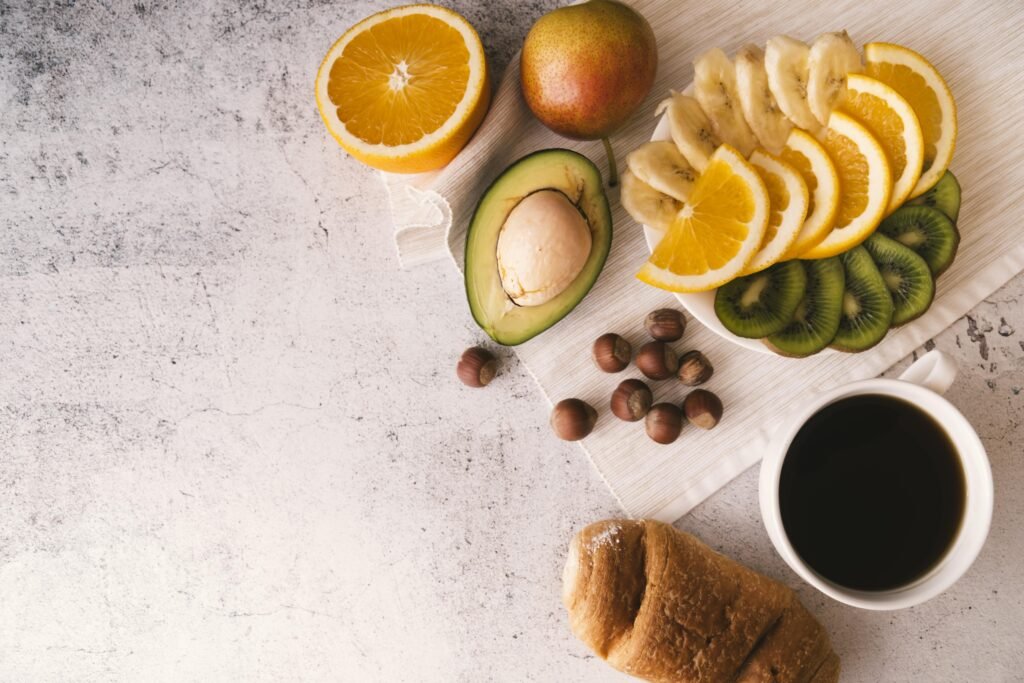Why Gut Health Deserves a Spot in Your Morning Routine
Have you ever started your day feeling bloated, sluggish, or just a bit “off”? I’ve been there. For years, I would wake up and rush straight into work, skipping breakfast or grabbing a sugary coffee on the go. My energy crashed by 10 a.m., and my gut? Let’s just say it wasn’t thrilled with my choices.
Then I learned something that changed everything: your gut sets the tone for your entire day. It’s not just about digestion—your gut plays a massive role in your immunity, mood, energy levels, and even mental clarity.
Today, I’m going to walk you through 7 simple yet powerful morning rituals for gut health that helped me feel more vibrant, energized, and yes—more regular.
These aren’t extreme detox hacks or expensive supplements. They’re gentle habits backed by science and seasoned with a bit of personal trial and error.
Ready to wake up with your gut smiling? Let’s dive in.
Table of Contents
Morning Rituals for gut health:

1. Start with Warm Lemon Water (Hydration + Alkalinity = Gut Bliss)
Why it works:
Drinking a glass of warm lemon water first thing in the morning is like giving your digestive system a gentle wake-up call. It hydrates your body after hours of sleep, flushes out toxins, and stimulates digestive enzymes that help break down food throughout the day.
My experience:
I used to grab coffee first thing—big mistake. My stomach would feel acidic and unsettled. Once I swapped that out for a simple glass of warm water with half a lemon squeezed in, I noticed a huge difference. My digestion felt smoother, and I was actually less reliant on caffeine to wake up.
How to do it:
- Heat a cup of filtered water until it’s warm—not boiling.
- Squeeze in half a fresh lemon.
- Sip slowly, ideally 15–30 minutes before breakfast.
Bonus tip: Add a dash of apple cider vinegar or a few slices of ginger for an extra gut-friendly kick.
2. Practice Morning Movement (Even Just 5 Minutes)
Why it works:
Gentle movement gets the digestive tract moving and promotes regular bowel activity. When you move, especially after waking up, you stimulate peristalsis — the muscle contractions that move food through the digestive system. Movement also triggers the release of endorphins, reducing stress and inflammation.
My routine:
I typically start with five to ten minutes of yoga poses specifically targeted at digestion. Cat-Cow helps massage the intestines, Seated Twist aids in detoxification, and Downward Dog encourages blood flow to the gut. On days when I need energy, I go for a quick walk around the block.
Easy movement options:
- 5 to 10-minute yoga flow (focus on twisting and stretching)
- Light walking or rebounding on a mini trampoline
- Dancing to your favorite upbeat song
Personal anecdote: Before I made this a habit, I often felt heavy and lethargic after breakfast. Now, I find that just a little movement beforehand boosts my appetite and keeps everything “flowing.”
Science says: According to the American Journal of Gastroenterology, moderate exercise enhances gut microbiome diversity and can improve the symptoms of irritable bowel syndrome (IBS).
3. Prioritize a Gut-Friendly Breakfast

Why it works:
The first food you eat sets the stage for your entire digestive day. A breakfast rich in fiber, healthy fats, and fermented foods provides the right fuel for your microbiome. Gut-friendly breakfasts help stabilize blood sugar, improve nutrient absorption, and prevent bloating.
My favorites:
One of my go-tos is overnight oats made with almond milk, chia seeds, ground flaxseed, blueberries, and a dollop of plain kefir. This gives a mix of prebiotic fiber, omega-3s, antioxidants, and probiotics. Sometimes I add walnuts or pumpkin seeds for crunch and extra minerals.
When I want something savory, I opt for scrambled eggs cooked in olive oil with a side of steamed spinach, kimchi, and a slice of sprouted grain toast. This combo delivers protein, leafy greens, and a fermented food punch.
Other gut-friendly breakfast ideas:
- Smoothie with spinach, avocado, banana, Greek yogurt, and prebiotic fiber (like inulin or acacia)
- Quinoa porridge with apple slices and cinnamon
- Buckwheat pancakes with almond butter and raspberries
What to avoid:
- Sugary cereals
- White bread or pastries
- Skipping breakfast altogether
Science says: A study in Cell Metabolism suggests that people who consume a higher intake of dietary fiber and fermented foods experience improved gut microbiome diversity and reduced inflammatory markers
4. Take a Quality Probiotic Supplement
Why it works:
Probiotics are live microorganisms that help balance your gut flora. Taking them in the morning, ideally on an empty stomach, allows the bacteria to travel through your digestive tract with less interference. A healthy gut flora supports digestion, nutrient absorption, and immune function.
My experience:
After trying multiple brands, I finally found one that included multiple strains (Lactobacillus acidophilus, Bifidobacterium longum, and Saccharomyces boulardii). Within two weeks, my bloating decreased dramatically, and I had more mental clarity.
How to choose the right probiotic:
- Go for at least 10 billion CFUs (colony forming units)
- Look for multi-strain formulations
- Choose a reputable brand, preferably one that is shelf-stable or refrigerated
Optional extras:
- Rotate strains every 2-3 months to ensure diversity
- Pair with a prebiotic supplement or prebiotic-rich foods like garlic, onion, or green bananas
Science says: According to Frontiers in Microbiology, probiotic supplementation can have positive effects on gastrointestinal function, immune response, and even psychological well-being through the gut-brain axis.
5. Journal or Meditate for 10 Minutes

Why it works:
Your gut and brain are connected through the vagus nerve. High levels of stress can directly interfere with digestion, cause bloating, and disrupt the gut microbiome. Meditation and journaling reduce cortisol levels, promote relaxation, and stimulate the parasympathetic nervous system.
What I do:
I start each morning by writing down three things I’m grateful for, one small goal for the day, and a positive affirmation. Then I sit for five minutes of deep breathing or a guided meditation using apps like Insight Timer or Calm.
Journal prompts for gut awareness:
- What does my body need this morning?
- How did my gut feel yesterday?
- What will I eat today that feels good in my body?
Meditation ideas:
- Body scan meditation focusing on the abdominal area
- Breathwork: 4-4-8 technique (inhale 4s, hold 4s, exhale 8s)
Science says: Research published in Psychosomatic Medicine confirms that mindfulness meditation can reduce gastrointestinal distress and improve symptoms in people with IBS.
6. Go for a Morning Bathroom Break
Why it works:
Consistency in elimination is a huge marker of gut health. Many people struggle with constipation or irregular bowel movements because they don’t create a consistent schedule. Your body thrives on routine, and making time to go every morning can support regularity and reduce toxins.
My method:
Even if I don’t feel an urge, I sit for a few minutes after drinking my lemon water and stretching. I focus on breathing deeply and relaxing. Most days, this helps my body sync into a rhythm.
Helpful tips:
- Use a footstool to elevate your knees and simulate a squat position
- Avoid screens or reading on the toilet; instead, focus on breath
- Don’t rush — allow yourself 5-10 minutes
Signs of a healthy gut:
- Daily elimination
- Medium to dark brown stools
- Smooth, soft texture (not too hard or watery)
Science says: A review in the World Journal of Gastroenterology notes that lifestyle habits like consistent wake times and early morning routines are linked to improved bowel health and microbiome balance.
7. Set an Intentional, Unrushed Tone for Your Day
Why it works:
Starting the day in a rush can trigger the sympathetic nervous system (fight-or-flight), which slows down digestion and impairs nutrient absorption. A calm morning signals safety to your gut, allowing it to function optimally.
How I create calm:
I set my alarm 30 minutes earlier than necessary so I don’t have to rush. I don’t check my phone for the first hour. Instead, I play soft music, diffuse essential oils, and focus on slow, deliberate movements.
Tips for a mindful start:
- Use peppermint or ginger essential oil in a diffuser
- Light a candle and sip your lemon water mindfully
- Recite a calming mantra like, “I start my day with peace and power”
Science says: Studies in Gut Microbes suggest that psychological stress impacts the gut barrier and microbiota. Mindful morning routines help maintain a healthy gut-brain connection.
Common Morning Mistakes That Sabotage Your Gut
Before you go, check if you’re unintentionally doing any of these:
- ❌ Chugging iced coffee on an empty stomach
- ❌ Skipping breakfast or eating sugary pastries
- ❌ Checking emails or social media first thing (stress spike!)
- ❌ Holding in bowel movements or delaying bathroom time
- ❌ Ignoring your body’s hunger or fullness cues
Small tweaks = major relief.
Conclusion: Your Gut is Your Morning Compass
Each of these rituals is small on its own, but together, they create a powerful foundation. Since integrating them into my mornings, I feel more in tune with my body, more energized, and less bogged down by digestive issues.
Your gut health doesn’t have to be complicated. It starts with consistency and kindness. Give your gut the attention it deserves in the morning, and it will thank you all day long.
Start small. Maybe begin with just lemon water and a 5-minute stretch. Add a new ritual each week until it becomes a habit. Within a month, you might find yourself waking up feeling lighter, clearer, and more vibrant.
Gut Health FAQs
Q: How long does it take to improve gut health with these rituals?
A: Many people start feeling better within 1–2 weeks. Full microbiome shifts can take 30–90 days with consistent habits.
Q: Should I still take probiotics if I eat fermented foods?
A: Yes! While fermented foods are fantastic, a high-quality supplement ensures a therapeutic dose and strain diversity.
Q: Can I follow these rituals even if I work early or have kids?
A: Absolutely. Most of these can be done in under 10 minutes. Customize to fit your schedule — gut health thrives on consistency, not perfection.
